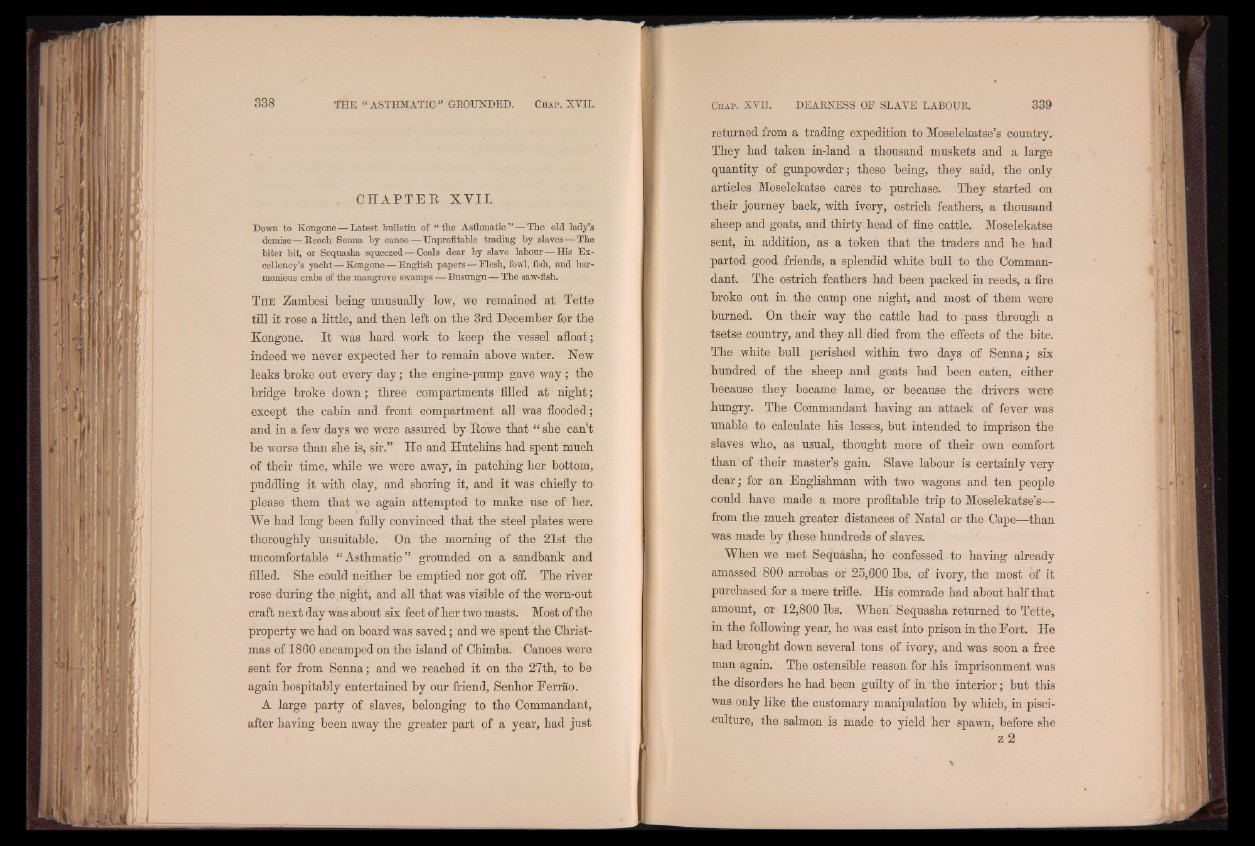
C H A P T E R X V I I .
Down to Kongone—Latest bulletin of “ the Asthmatic” — The old lady’s
demise—Reach Senna by canoe — Unprofitable trading by slaves—The
biter bit, or Sequasha squeezed—Coals dear by slave labour — His Excellency’s
yacht—Kongone —English papers—Flesh, fowl, fish, and harmonious
crabs of the mangrove swamps — Busungu — The saw-fish.
T h e Zambesi being unusually low, we remained at Tette
till it rose a little, and tben left on tbe 3rd December for the
Kongone. It was bard work to keep tbe vessel afloat;
indeed we never expected her to remain above water. Hew
leaks broke out every day; tbe engine-pump gave way; tbe
bridge broke down; tbree compartments filled at night;
except the cabin and front compartment all was flooded;
and in a few days we were assured by Howe that “ she can’t
be worse than she is, sir.” He and Hutchins bad spent much
of their time, while we were away, in patching her bottom,
puddling it with clay, and shoring it, and it was chiefly to
please them that we again attempted to make use of her.
We had long been fully convinced that the steel plates were
thoroughly unsuitable. On the morning of the 21st the
uncomfortable “ Asthmatic” grounded on a sandbank and
filled. She could neither be emptied nor got off. The river
rose during the night, and all that was visible of the worn-out
craft next day was about six feet of her two masts. Most of the
property we had on board was saved; and we spent the Christmas
of 1860 encamped on the island of Chimba. Canoes were
sent for from Senna; and we reached it on the 27th, to be
again hospitably entertained by our Mend, Senhor Ferrao.
A large party of slaves, belonging to the Commandant,
after having been away the greater part of a year, had just
returned from a trading expedition to Moselekatse’s country.
They had taken in-land a thousand muskets and a large
quantity of gunpowder; these being, they said, the only
articles Moselekatse cares to purchase. They started on
their journey back, with ivory, ostrich feathers, a thousand
sheep and goats, and thirty head of fine cattle. Moselekatse
sent, in addition, as a token that the traders and he had
parted good friends, a splendid white bull to the Commandant.
The ostrich feathers had been packed in reeds, a fire
broke out in the camp one night, and most of them were
burned. On their way the cattle had to pass through a
tsetse country, and they all died from the effects of the bite.
The white bull perished within two days of Senna; six
hundred of the sheep and goats had been eaten, either
because they became, lame, or because the drivers were
hungry. The Commandant having an attack of fever was
unable to calculate his losses, but intended to imprison the
slaves who, as usual, thought more of their own comfort
than of their master’s gain. Slave labour is certainly very
dear; for an Englishman with two wagons and ten people
could have made a more profitable trip to Moselekatse’s—
from the much greater distances of Natal or the Cape—than
was made by these hundreds of slaves.
When we met Sequasha, he confessed to having already
amassed 800 arrobas or 25,600 lbs, of ivory, the most of it
purchased for a mere trifle. His comrade had about half that
amount, or 12,800 lbs. When' Sequasha returned to Tette,
in the following year, he was cast into prison in the Fort. He
had brought down several tons of ivory, and was soon a free
man again. The ostensible reason, for his imprisonment was
the disorders he had been guilty of in the interior; but this
was only like the customary manipulation by which, in pisciculture,
the salmon is made to yield her spawn, before she
z 2